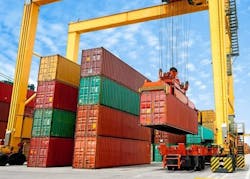The immediate impact of Russia’s invasion of Ukraine on container shipping has been “fairly small” so far, says Simon Heaney, senior manager, container research, for Drewry, a global shipping industry consultancy.
“While no one knows how this story will play out in the long run, there were some immediate, obvious consequences” to Russia’s decision to attack Ukraine, according to Heaney.
Oil prices "jumped to a seven-year high of $100 per barrel hours after the invasion, (and) stock markets around the world slumped, with Russian stocks falling particularly sharply, while the ruble crashed to a record low."
Commodity and energy prices surged.
“The fall-out for international container shipping will likely take longer to materialize and the immediate operational threat is relatively small outside of the locality,” Heaney wrote in a recent briefing on Drewry’s website.
“Retaliatory cyber-attacks that might affect shipping and fast-rising fuel costs are probably the main concerns right now.”
He noted that “shipping will avoid the Black Sea for the foreseeable future … but in any case, there were only three inter-continental services - on the major trades that Drewry tracks - calling at ports in the region so disruption to international liner networks will not be catastrophic.”
The outlook for global container shipping “is intrinsically tied to the global economy and it is a near certainty that (Russia President Vladimir) Putin’s gambit will lead to more economic volatility, heaping even more inflation onto people all over the world still reeling from the pandemic.”
Consumer reaction to high levels of inflation “is one of the biggest wildcards when trying to predict the outlook for the container market. Global port handling growth has been slowing for the past few months and another sudden increase in the cost of living would only serve to diminish prospects further.
“We can envision a scenario, which for the time being we will put as a very low probability, in which an inflation-racked economy leads to an unexpected contraction in container demand,” he wrote.
“It is within the realms of possibility that a trade slowdown will be steep enough to release some of the pressure on the container supply chain, giving ports the necessary breathing space to break out of the congestion cycle. War would be far too high a price to pay for that cure.”
Drewry has offices in the United Kingdom, China, India and Singapore. Its website can be accessed here.



